Organic flowers: A fresh bouquet
July 17th, 2009
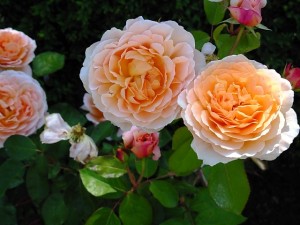
A glorious English rose, photographed in Skagit Valley on a summer day
Flowers lovers understand me when I talk about the disconnect that’s going on between the demand for organically-grown food and the miniscule desire for organically-grown flowers. I guess the argument goes: As long as I’m not EATING those flowers, why should I be bothered that a few chemicals were used on them in the field or after they were harvested?
Gardeners and flower fanatics alike have Amy Stewart and Flower Confidential to thank for heightening our awareness of this contradiction. The idea that we can enjoy the beauty of a bouquet’s stems and blooms while knowing that the growing process may have harmed the earth and those who grew the flowers is crazy! How can we honestly enjoy flowers in our homes or as symbols of our most sentimental occasions when they were drenched in chemicals or shipped thousands of miles on a jet flying across the ocean?
Thankfully, there is a burgeoning “slow flower” movement afoot, and I urge you to join me as we use our pocketbooks and consumer influence to encourage reversal of flower-growing practices that use herbicides, pesticides and non-organic fertilizers. I hope the momentum continues and becomes an ever-present conversation between flower purveyors and flower consumers. I can’t tell you how many times I witness friends ask a waiter if the fish on the menu was “wild catch” or “farm raised.” Similarly, when I buy flowers, I want to know: Were they were grown organically?
”]![erinbenzakein001 From our piece in Sunset: Erin with her son Jasper [David Perry photograph]](https://www.slowflowerspodcast.com/wp-content/uploads/2009/03/erinbenzakein001-237x300.jpg) In addition to the essays in Flower Confidential, I have Erin Benzakein to thank for my education about seasonal, sustainable and local flower-growing. Erin owns floret flowers, a Mount Vernon, Wash.-based micro-farm where she uses organic practices to raise beautiful, unusual blooms for bouquets, floral designers and wedding clients. Erin is featured in a recent issue of Sunset magazine, along with my short Q-and-A and a gorgeous photograph by David Perry.
In addition to the essays in Flower Confidential, I have Erin Benzakein to thank for my education about seasonal, sustainable and local flower-growing. Erin owns floret flowers, a Mount Vernon, Wash.-based micro-farm where she uses organic practices to raise beautiful, unusual blooms for bouquets, floral designers and wedding clients. Erin is featured in a recent issue of Sunset magazine, along with my short Q-and-A and a gorgeous photograph by David Perry.
For David and me, the desire to meet, interview, photograph and document organic flower growers has been under our skin for a few years now. Other creative projects, family demands, and sheer marketplace apathy have slowed us slightly. But we both keep returning to the subject of organic flowers. I can’t let go of the notion that this is an important topic – one that needs to be shared in order to educate, inform, inspire and – change – the relationship people have with the flowers.
While in the Northwest two weeks ago, I had a wonderful chance to visit yet another organic flower farm: Jello Mold Farm. The project of Diane Szukovathy and Dennis Westphall is an example of priorities put into practice for a commercial venture. As they write on their beautiful web site (you’ll see many of David’s photographs there), “Our flowers are safe to sniff.”
My cohort, David, an amazing photographer with whom I’ve been on this occasional journey, drove me north to Skagit Valley. We had a few stops along the way, including a sandwich at a cool roadside deli and a quick visit to Christianson’s Nursery to feast our eyes upon the cottage borders (Christianson’s is one of my favorite charming places – where plants happily coexist with weathered farm buildings).
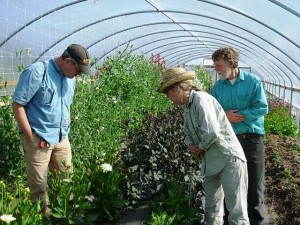
David Perry, Diane Szukovathy and Dennis Westphall at Jello Mold Farm
We arrived at Diane and Dennis’s place as they came home from a day of making deliveries to customers in the Seattle area. They deliver a heady array of fresh, field-cut flowers every Monday and Thursday to Seattle area designers, event planners and retail florists.
Time to sit down for a cold one and a good gab around the kitchen table, as we all got to know one another and talk about the flower biz.
Here are some snippets from our four-way conversation. It will give you a flavor for the longer feature story we want to publish about them:
+First things first. The name Jello Mold Farm is a curious one that always invokes a question. It is an offshoot of Diane and Dennis’s gardening business, Jello Mold Landscape, which got its name from a crazy building in Seattle’s Belltown neighborhood that Diane once covered with 400 copper-hued jello molds of all shapes and patterns. Read that history here.
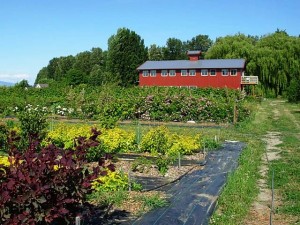
Jello Mold Farm, fields, and barn
+Diane and Dennis have converted an 8-acre farm and its former horse pastures into a bountiful flower farm. They grow 150 varieties of blooms . . . with many, many more on the way.
+After years of estate gardening, Diane yearned to put her energy into a venture that combined her obsession for plants and her values. “I needed to do something else with my energy for my living. (Estate gardening) doesn’t fully feed my soul.”
+They started selling flowers last year and 2009 is their first season to have scheduled deliveries to wholesale customers. Diane emails an “availability list” to a growing group of flower buyers twice a week.
+In Seattle, you can find their flowers at Best Buds (Madison Park), Ballard Market, and several floral studios, including Terra Bella, an organic florist in the Greenwood District.
+They like to use the term “sustainably grown,” rather than organic. “Quality is our best calling card,” Diane says. “Fresh and local sells.”
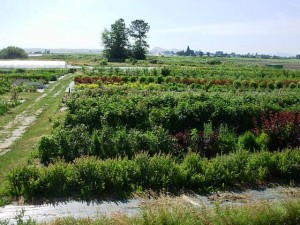
Rows upon rows of flowers ready to cut
+This is hard work, requiring 14 to 16 hour days. “There’s a whole romantic idea that we are so lucky to work on a flower farm,” Dennis admits. “People have no idea how hard we work.” Yet the couple believes they can make a decent living growing flowers rather than food, a lesson they learned after volunteering with a local CSA farmer. “There’s no way we could make a mortgage growing food,” Dennis points out.
+Making bouquets is extremely time-consuming, so Jello Mold often sells straight bunches of a single type of flower, such as dahlias. But when they do make bouquets, “I always try and put in something unique, to create a following,” Diane says. As an example, she showed me a simple bouquet with five dark pink peonies gathered within a pillow of lime-colored Alchemilla mollis (Lady’s-Mantle). They also use a lot of food in their bouquets, like berries, vines and fruiting branches.
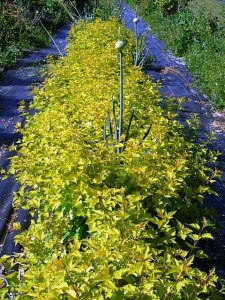
A stray allium puts a smile on my face
+Organic growers are not able to command a higher price for their cut flowers. They have to meet the same market prices charged by growers using standard, non-sustainable practices.
+Slowly, over time, this may change. But only when consumers value the health benefits (to themselves and to the planet) of bringing home an organic, sustainably-grown bouquet. “It’s in the food movement already,” Diane says. It’s only a matter of time for the floral trade (and their customers) to catch up.
+This is an emotion-based business. One of passion and conviction. Diane and Dennis take delight in seeing people make an emotional connection to their flowers. They want to take care to grow sustainably in a world where such practices don’t make financial sense to larger growers. “Ours is a better way to grow a business,” Diane says.
It was so hard to leave with our conversation just getting started. But I’m inspired and encouraged to know these new friends. And to know they are living their passion and convictions every day.









July 18th, 2009 at 2:32 pm
Great article on the challenges faced by eco florists and organic flower farmers. Keep up the great work of educating. I’m sure this is just the tip of the iceberg of possible articles on this subject. Scott
July 21st, 2009 at 8:16 pm
I am so happy to learn there are commercial flower growers using sustainable methods. Many home gardeners who care about the environment are gardening organically. Keep up the good work! Pamela
July 22nd, 2009 at 3:38 pm
You’ve begun an important conversation and – I believe – commenced an equally exciting and important project. Viva la Flowers!!!
oxox Lorene
.-= Lorene´s last blog ..Yet another Hummingbird update =-.
October 3rd, 2009 at 7:54 am
every food that we eat should come from Organic Farming. i really get scared about those toxins coming from chemical fertilizers and chemical pesticides. I only eat foods which are certified that they are organically grown
April 4th, 2010 at 9:11 pm
I own my own florist in Australia and although it may seem a little contradictory but I am a greenie at hear. So, it is really fabulous to ehar that commercial flowers are now taking a greener path to get to their owners – it is only a shame that it will be so long before the message heads Downunder.
Siobhan
May 2nd, 2010 at 6:52 pm
We love using fresh organic flowers from our local area for our cakes…they add so much more natural beauty to them and they smell amazing! Organic foods are certainly the way to go now because of the increased risk for all these cancers and other mysterious diseases and ailments.
August 15th, 2010 at 12:12 pm
can anyone suggest a good florist in the San Francisco bay area? i want to send roses to my girlfriend,.-
April 10th, 2011 at 7:37 pm
I worked with a man from Eritrea who said that the factory farming of flowers is radically changing land ownership and crop growing patterns. Apparently huge corporations buy and factory farm tulips and such in places that really shouldn’t have those kinds of crops growing. Makes me leery of florist flowers. Diane & Dennis, your time has definitely come!
Local rules.
November 17th, 2011 at 1:18 pm
growing organic roses…
[…]Debra Prinzing » Blog Archive » Organic flowers: A fresh bouquet[…]…
March 7th, 2012 at 1:01 pm
Question about 5-Mile Bouquet, article in Sunset Magazine, February 2012. On page 74 there is a picture of, I believe my brother, Pete Gonzalves planting lowers. He is bare foot and in the first picture frame across both pages of the article. Can you just tell me if that is in deed, Pete Gonzalves?
Many thanks,
Lynn Battenberg
480-444-8822 Cell
480-315-9434 Home
August 14th, 2013 at 5:39 am
[…] Click here for more background on Diane and Dennis of Jello Mold Farm. […]
April 26th, 2017 at 2:51 am
The best thing is the organic flowers.